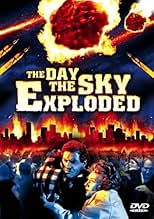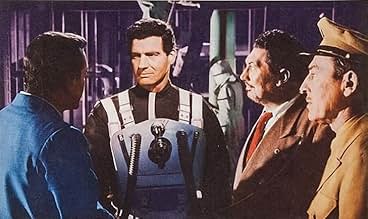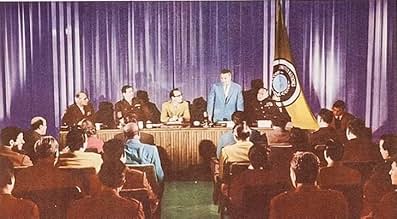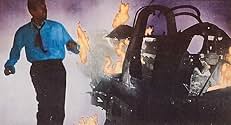Aggiungi una trama nella tua linguaScientists discover that a group of meteors are hurtling on a collison course with Earth, and if they hit, the planet will be destroyed.Scientists discover that a group of meteors are hurtling on a collison course with Earth, and if they hit, the planet will be destroyed.Scientists discover that a group of meteors are hurtling on a collison course with Earth, and if they hit, the planet will be destroyed.
- Regia
- Sceneggiatura
- Star
Madeleine Fischer
- Katy Dandridge
- (as Madeline Fischer)
Dario Michaelis
- Peter Leduq
- (as Darrio Michaelis)
Gérard Landry
- Randowsky
- (as Sam Galter)
Jean-Jacques Delbo
- Sergei Boetnikov
- (as Jean Jacques Delbo)
Annie Berval
- Lab Assistant
- (non citato nei titoli originali)
S. Louis Casta
- Doctor
- (non citato nei titoli originali)
Livio Lorenzon
- British General
- (non citato nei titoli originali)
Peter Meersman
- General van Dorff
- (non citato nei titoli originali)
Shane Rimmer
- John McLaren
- (English version)
- (voce)
- (non citato nei titoli originali)
Giacomo Rossi Stuart
- Stuart
- (non citato nei titoli originali)
Gianni Solaro
- French General
- (non citato nei titoli originali)
Massimo Zeppieri
- Dennis McLaren
- (non citato nei titoli originali)
Recensioni in evidenza
«Death Comes From Space» is one of those films whose good intentions and effort to create stunning visual effects, contrary to their low budget, surpass its achievements. Earth is in danger once again, because of a meteor shower that diverted to the planet, when space travel goes wrong. The main plot involves the American astronaut who went to space and a female scientist (Swiss actors Paul Hubschmid and Madeleine Fischer, respectively), who have the mission of finding the solution to save everyone. In the middle of the story, a family sub-plot interferes, but the moments of destruction are stronger, as shown on the screen, thanks to footage of natural disasters and people in danger, combined with images created by cinematographer Mario Bava, famous for creating effects and atmospheres with little. A minor and certainly rare contribution of Italian cinema in the science fiction genre, but welcome.
A multi-national space mission including astronauts from the UK, the USA and the Soviet Union venture into space but they experience technical problems resulting in the mission being aborted, but unfortunately this is just the first in a chain reaction of events which results in catastrophic disasters back on Earth, including scores of asteroids, earthquakes and extreme weather.
The Day the Sky Exploded is fairly notable for being the first Italian sci-fi movie. Having said that, this is a fairly limited claim to fame given science fiction wouldn't exactly go on to become one of the movie sub-genres that the pasta masters are most well remembered for. This one is fairly ahead of its time in some respects though and quite ambitious for its time. It also is unusual in that it showed Americans and Russians working happily together at the height of the Cold War. So, it has some interesting things about it for sure but on the whole it was pretty forgettable stuff unfortunately. Interestingly, it was also photographed by the great future directing legend Mario Bava; to be honest, the version I saw this was a public domain pan-and-scan copy in which it was difficult to really tell if it had great cinematography or not sadly.
The Day the Sky Exploded is fairly notable for being the first Italian sci-fi movie. Having said that, this is a fairly limited claim to fame given science fiction wouldn't exactly go on to become one of the movie sub-genres that the pasta masters are most well remembered for. This one is fairly ahead of its time in some respects though and quite ambitious for its time. It also is unusual in that it showed Americans and Russians working happily together at the height of the Cold War. So, it has some interesting things about it for sure but on the whole it was pretty forgettable stuff unfortunately. Interestingly, it was also photographed by the great future directing legend Mario Bava; to be honest, the version I saw this was a public domain pan-and-scan copy in which it was difficult to really tell if it had great cinematography or not sadly.
This is significant as Italy's first science-fiction movie – two years after its first horror outing, Riccardo Freda's I VAMPIRI (1956); what connects these two films is the multi-faceted involvement behind the cameras of the late great Mario Bava. In fact, the latter was officially the film's cinematographer (curiously credited as Baja on the English titles!) but, as was his fashion, he helped out without credit in the special effects department and the direction as well – a fact also mentioned in Tim Lucas' Audio Commentary for the subsequently deleted Dark Sky DVD of Bava's KILL, BABY
KILL! (1966) and whose hearing prompted me to acquire this film sooner rather than later! Interestingly, the film's original Italian title LA MORTE VIENE DALLO SPAZIO translates to DEATH COMES FROM OUTER SPACE; this was picked up and slightly altered a few years later by another Spaghetti sci-fi entry i.e. Antonio Margheriti's LA MORTE VIENE DAL PIANETA AYTIN aka THE SNOW DEVILS (1967); besides, the film's English title was probably inspired by another contemporary sci-fi cheapie i.e. Fred F. Sears' THE NIGHT THE WORLD EXPLODED (1957)! The film under review emerges as a reasonably enjoyable and above-average entry but, probably stemming from a very limited budget, is bogged down by a talky script and much stock footage of rocket launchings and people rushing into underground shelters. The cast is also somewhat undernourished but does include Paul (Fritz Lang's Indian EPIC diptych [1958-59]) Hubschmid, Ivo (Bava's BLACK Sunday [1960]) Garrani and Giacomo (KILL, BABY
KILL!) Rossi Stuart essaying stock-types of lock-jawed astronaut, self-sacrificing professor and no-nonsense technician respectively. Equally predictable are the characters of the proud Russian expert, the astronaut's lonesome wife, the brainy female scientist, her lothario colleague and the crazed skeptic who reaches breaking-point as Armageddon looms. Nevertheless, despite – or, perhaps, because of – the lack of any really spectacular sequences (the rain of meteorites ostensibly about to annihilate mankind never pose that much of a threat since they are themselves destroyed just as they are entering the Earth's orbit!), one finds himself being charmed just the same by all these overly-familiar elements. Almost needless to say, hot on the heels of this movie came the Riccardo Freda/Mario Bava melange of sci-fi and monster movie – CALTIKI, THE IMMORTAL MONSTER (1959) – which was an altogether livelier effort...
It is hard to give a rating to old movies like this. This Italian/French film is a predecessor to modern fare like Meteor or Armegeddon.
No Bruce Willis, but Paul Hubschmid, the first Swiss film star. He is on a team of astronauts that included a Frenchman and a Russian and was selected for the first mission in space. Such international cooperation! Absolutely brilliant for the time. It will be even more amazing as the film goes on.
Don't look for great acting or fancy special effects. Stock footage is the norm and the dialog is corny, but there is a bright shining moment when they know they are all doomed and some scientist wigs out.
The solution to the falling meteor is the use of all the nation's atomic warheads. Like that would happen. You know the USA or Russia, probably both, would hold a few in reserve. I am sure the USA did, as I saw no missiles leaving silos.
It's interesting to see the first films of this type before CGI, which is why I am investing the week exploring them.
No Bruce Willis, but Paul Hubschmid, the first Swiss film star. He is on a team of astronauts that included a Frenchman and a Russian and was selected for the first mission in space. Such international cooperation! Absolutely brilliant for the time. It will be even more amazing as the film goes on.
Don't look for great acting or fancy special effects. Stock footage is the norm and the dialog is corny, but there is a bright shining moment when they know they are all doomed and some scientist wigs out.
The solution to the falling meteor is the use of all the nation's atomic warheads. Like that would happen. You know the USA or Russia, probably both, would hold a few in reserve. I am sure the USA did, as I saw no missiles leaving silos.
It's interesting to see the first films of this type before CGI, which is why I am investing the week exploring them.
One problem that has long bothered most filmmakers, since the dawn of cinema, is the smoke-and-mirrors magic act itself--namely, getting big, great, creative ideas that movie watchers will be interested in and like, while getting these ideas across in as budget-conscious a manner as possible. Take this film, 'The Day the Sky Exploded', for instance (but make sure you give it back--I liked it LOL). Rome-born director Paolo Heusch (who later made the no-budget enjoyable thriller, 'Werewolf in a Girl's Dormitory') wisely utilized as much stock footage as humanly possible, and a fine cinematographer in future horror-aficionado hero Mario Bava (though his name is bizarrely misspelled in the film's credits), to credibly bring his ambitious ideas of widespread panic and civil unrest to fruition.
Mildly problematic is the dated way that women are portrayed here. Usually in older films, this isn't bothersome to me, simply because it was so widespread, and thus expected to a certain extent, but that doesn't mean it was right. For example, the only two principal women in the film are the wife of the main astronaut, who basically is left to complaining that she doesn't get enough attention from him while the world is in chaos, and a math expert, considered 'cold' because she dares to simply think about her job, who basically falls to pieces when the going gets tough (though, to her credit, she comes to her senses). And, playing the devil's advocate for a moment, it was kind of crappy that it was a Russian who went crazy and made thinks difficult for the scientists who were binding together to try and save the world. But those are minor nit-pickings.
It made me very happy to watch this valiant cinematic attempt. It left me far more satisfied than later, big-budget efforts in the area, such as 'Deep Impact' and 'Armageddon'. Some fanfare for the common man, please! =)
Mildly problematic is the dated way that women are portrayed here. Usually in older films, this isn't bothersome to me, simply because it was so widespread, and thus expected to a certain extent, but that doesn't mean it was right. For example, the only two principal women in the film are the wife of the main astronaut, who basically is left to complaining that she doesn't get enough attention from him while the world is in chaos, and a math expert, considered 'cold' because she dares to simply think about her job, who basically falls to pieces when the going gets tough (though, to her credit, she comes to her senses). And, playing the devil's advocate for a moment, it was kind of crappy that it was a Russian who went crazy and made thinks difficult for the scientists who were binding together to try and save the world. But those are minor nit-pickings.
It made me very happy to watch this valiant cinematic attempt. It left me far more satisfied than later, big-budget efforts in the area, such as 'Deep Impact' and 'Armageddon'. Some fanfare for the common man, please! =)
Lo sapevi?
- QuizThe voice of the American astronaut is provided by Shane Rimmer, a Canadian actor better known for voicing Scott Tracey in Thunderbirds (1965).
- BlooperSouth America and Africa are very distorted on the large world map in the control room.
- Citazioni
Katy Dandridge: Something troubling you?
Peter Leduq: You!
Katy Dandridge: I?
Peter Leduq: That cool beauty ..
Katy Dandridge: Oh
Peter Leduq: It freezes my powers of concentration.
- Curiosità sui creditiFor the English dubbed version, director of photography Mario Bava's name is given as "Mario Baja." His camera operator, Ubaldo Terzano, is listed as "Uraldo Terzano."
- ConnessioniFeatured in Fright Night Late Show: The Phantom Planet (1969)
I più visti
Accedi per valutare e creare un elenco di titoli salvati per ottenere consigli personalizzati
- How long is The Day the Sky Exploded?Powered by Alexa
Dettagli
- Tempo di esecuzione
- 1h 22min(82 min)
- Colore
- Mix di suoni
Contribuisci a questa pagina
Suggerisci una modifica o aggiungi i contenuti mancanti
























